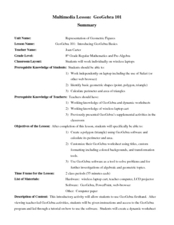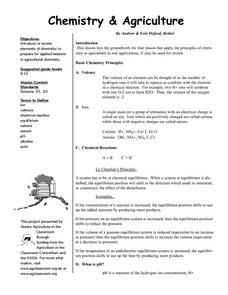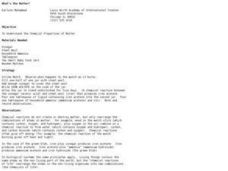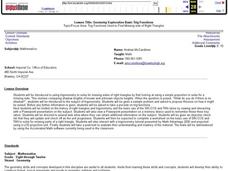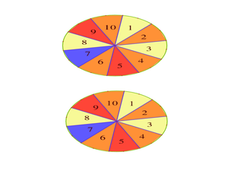Curated OER
Basic Needs of Living Things - Lesson One
An interesting way of teaching about basic needs of different organisms awaits your fourth graders. Pupils take part in class discussions and demonstrations which should lead to a greater understanding of how to determine basic needs. As...
Curated OER
Basic Needs of Living Things - Lesson Two
Fourth graders study and identify the basic needs of a variety of organisms. Terrariums and aquariums are used to demonstrate what plants, animals, and fish need to stay alive. These two classic models are used to effectively convey what...
Curated OER
Habitat Basics
First graders get out and explore two different habitats to examine how each one meets the needs of the plants and animals that dwell there. They discuss what they've learned about animal habitats as they explore the outdoor environment....
Curated OER
Back To the Basics: Measurement
Lead the class in a review of the basic concepts and procedures involved in measuring length, weight, and volume. After whole group instruction, small groups and individuals practice measuring by completing a variety of fun activities...
Curated OER
Basic Needs of Plants
Second graders conduct a plant experiment. In this basic needs of plants instructional activity, 2nd graders observe plants for two weeks. Students record data from their plants in journals.
Curated OER
Geogebra Basics
Students identify basic geometric shapes using Geogebra. In this geometry lesson, students work on a laptop as they explore different geometric shapes. They calculate the area and perimeter of triangles.
Curated OER
Basic Needs of Living Things-Lesson One
Fourth graders explore the basic needs of living things. They observe a variety of living things and identify the basic needs of each living item. Students create food balls of peanut butter and nuts to feed animals. They hang their food...
Curated OER
Basic Needs of Plants
Fourth graders explore the four basic needs of plants. They examine plants as they grow. Students discuss the changes that they see in the growing plants. They observe what happens to a plant when one of its basic needs is taken away.
Curated OER
Periodic Behavior of Oxides
Students investigate the properties of oxides and observe their periodic trends. In this behavior of oxides lesson plan, students experiment with metallic oxides and non-metallic oxides to determine if they are acid, basic or amphoteric...
Curated OER
Basics of Environmental Science
Ninth graders explore environmental concerns of the community and identify the basic needs of people, wildlife and domestic animals. Working both individually and in groups, they also define natural resources and compare and contrast...
Curated OER
Basic Chemistry Principles
High schoolers use the basic principles of Chemistry to determine pH levels. Elements of the Periodic Table are also included in this lesson.
Curated OER
Basic Food Items
Learners explore healthy eating by defining food vocabulary terms. In this food purchasing lesson, students utilize word/picture cards to participate in a food identification activity among their classmates. Learners read a list of food...
Curated OER
What's the Matter? (Living and Non-Living Things)
Understand how chemical reactions recombine atoms to create the "chemicals of life". An experiment, showing the basic chemical reactions of an iron nail or a match, helps young children start their understanding of permanent changes.
Curated OER
Geometry Exploration Basic Trig Functions
Tenth graders solve for missing sides on a triangle using the Pythagorean Theorem. In this geometry lesson, 10th graders are introduced to basic trigonometry functions as they solve problems of right triangles. They discuss the formulas...
Curated OER
Basic Darkroom Techniques
Students explore a fundamental knowledge of darkroom practice. Students access the basic aspects of black-and-white film processing, printing and enlarging. Students acquaint themselves with functions and purposes of darkroom equipment...
Curated OER
Calculating and Applying Basic Probability
Eighth graders investigate the basic concepts of probability. In this probability lesson, 8th graders learn the associated probability. They work with spinners, colored cubes in a bag, flip coins, and choose colored candies while they...
Curated OER
Basic Limits
Learners calculate the limits of functions. In this calculus lesson, students find the left and right handed limits of different functions. They use the Ti Navigator to drag the function around as they study limits.
Curated OER
Basic Equations
Ninth graders solve basic equations. In this algebra instructional activity, 9th graders solve linear equation using addition, subtraction, multiplication and division. They solve two step equations isolating the variable and putting the...
Acoustical Society of America
Wave Basics
Catch the fast wave. Using a computer simulation, pupils experiment with amplitude, frequency, damping, and tension of a string to determine which affects the speed of the wave. Learners record the observations to determine their...
EngageNY
Solving Basic One-Variable Quadratic Equations
Help pupils to determine whether using square roots is the method of choice when solving quadratic equations by presenting a lesson that begins with a dropped object example and asks for a solution. This introduction to solving by square...
EngageNY
Definition of Congruence and Some Basic Properties
Build a definition of congruence from an understanding of rigid transformations. The lesson asks pupils to explain congruence through a series of transformations. Properties of congruence emerge as they make comparisons to these...
EngageNY
Basic Trigonometric Identities from Graphs
Have young mathematicians create new identities! They explore the even/odd, cofunction, and periodicity identities through an analysis of tables and graph. Next, learners discover the relationships while strengthening their understanding...
EngageNY
Definition of Translation and Three Basic Properties
Uncover the properties of translations through this exploratory activity. Learners apply vectors to describe and verify transformations in the second installment of a series of 18. It provides multiple opportunities to practice this...
Teach Engineering
Fluid Power Basics
What can bulldozers and screen doors have in common? Use this instructional activity on fluid power to find out. It begins with some simple teacher demonstrations, includes a couple of videos, and culminates with an inquiry-based...
Other popular searches
- Basic Needs
- Basic Map Skills
- Basic Division
- Basic Math
- Basic Human Needs
- Basic Needs of Plants
- Basic Needs of Animals
- Basic Electricity
- Basic Needs and Wants
- Basic Accounting
- Basic Banking
- Basic Math Skills







